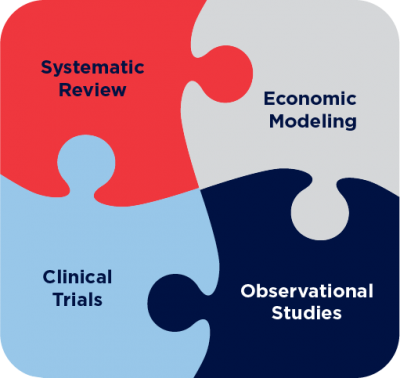
The UConn Health Outcomes, Policy, and Evidence Synthesis (HOPES) group codifies collective strength in the areas of outcomes research: Systematic Review and Meta-Analysis, Economic Modeling, Clinical Trials, and Observational Research. We provide the federal government and their key stakeholders (payors, clinicians, national medical and patient advocate organizations, and patients) with comparative effectiveness assessments that support evidence-based decisions.
Introduction/Mission
With a multidisciplinary group of faculty with wide ranging skills, an international reputation for excellence in outcomes research, and capacity to produce high quality results on strict deliverable schedules; we have a competitive advantage in the marketplace.
Our strength is derived from clinical expertise overlaid upon strong technical and methodological expertise. We understand the clinical dilemmas that our projects are meant to assess and create projects that have maximal clinical impact.
Healthcare decision makers, clinicians, and patients are overwhelmed with information and ill-prepared to determine which practices are truly evidence based. The United States healthcare system fails to optimally translate study results into clinical practice because its practitioners cannot assess the totality of the literature, reconcile discordant findings between studies, judge the strength and applicability of evidence from these findings, determine comparative effectiveness when one option has greater efficacy and fewer harms than another, and extrapolate the impact of clinical outcomes on cost-effectiveness or the impact of intermediate health endpoint alterations on final health outcomes.
Our mission is to promote optimal health outcomes by helping clinicians, patients and decision makers generate, synthesize, and analyze data that supports evidence-based practice. We help remedy the chasm between clinical practice/healthcare decision making and evidence-based decision-making by providing independent, objective, transparent, clinically relevant, and comprehensive projects that can then be directly translated into practice or policy guidelines, performance measures, educational programs, coverage decisions, and reimbursement policies. We drive understanding of the strengths and limitations of methodologies used in outcomes research to promote more transparent, scientifically rigorous, and consistent methodologies. We disseminate findings through peer reviewed publication, media relations, expert panels, and presentations at regional and (inter)national meetings.
Expertise
Methodological Expertise
| Systematic Reviews | Economic Modeling | Clinical Trials | Observational Studies | Advancing Outcome Methods |
| Traditional Meta-Analysis | Markov | Randomized, Controlled Trials | Multivariable Logistic Regression | Geographic Applicability Impact |
| Network Meta-Analysis | Decision-Tree | Piggyback Economic/Humanistic Studies | Propensity Score Matching/Adjustment | Bayesian & Frequentist Methods |
| Meta-Regression | Direct Cost to Charge | Cluster RCTs | Causal Inference Methods | Cluster RCTs |
Medical/Policy Specialties
| Arrhythmias | Mental Health | Diagnostic Tests | HIV Prevention and Treatment | Obesity |
| Thrombosis | Movement Disorders | Medical Devices | Infectious Disease | Diabetes |
| Atherosclerosis | Complementary Medicine | Cardiothoracic Surgery | Arthritis and Joint Disorders | Women’s Health |
| Heart Failure | Pulmonary Disease | Orthopedic Surgery | Medication Costs | Behavioral Interventions |
Groups/societies we have worked with worked with
• Agency for Healthcare Research and Quality
• American College of Physicians
• American Medical Society for Sport’s Medicine
• Cardiovascular Meta-analyses Research Group (a consortium of worldwide cardiovascular epidemiologists & cardiologists)
• American Society of Nuclear Cardiology/Intersocietal Accreditation Commission
• National Heart Lung and Blood Institute
• National Multiple Sclerosis Society and North American Research Committee on Multiple Sclerosis
• State of Connecticut Drug Utilization Review Board
• Society for Research Synthesis Methodology
• Department of Veterans Affairs Evidence-based Synthesis Group
• Cochrane Collaboration
International Awards
Our publications have received the Drug Therapy Research Award at the American Society of Health-System Pharmacists five times, the “Best Paper Award” from the Psychological Study of Social Issues, and the American Association of Colleges of Pharmacy Lyman Award. We have four ACCP Young Investigators of the Year and an ASHP Sustained Contribution to the Literature Winner. Because of the clinical importance of our publications, they have been included in the ACP Journal Club, Up-to-Date, and other textbooks where landmark reviews were cited. Our federal Comparative Effectiveness Review on ACE Inhibitors in Stable Coronary Disease was the most downloaded report from the Agency for Healthcare Research and Quality. Our projects have been covered by NBC Nightly News, Good Morning America, Today Show, Associated Press, National Public Radio, and hundreds of newspapers and online news-services.
Key Personnel and Locations
Michael White, Pharm.D., FCP, FCCP
Professor
UConn School of Pharmacy, Hartford Hospital
Diana Sobieraj, Pharm.D.
Assistant Professor
UConn School of Pharmacy, Hartford Hospital
Craig I Coleman, Pharm.D., FASHP
Professor
UConn School of Pharmacy, Hartford Hospital
William Baker, Pharm.D., FACC
Assistant Professor
UConn School of Pharmacy, Hartford Hospital
Adrian Hernandez, MD, PhD, FACC
Associate Professor
UConn School of Pharmacy, Hartford Hospital
We have collectively generated over 550 peer-reviewed publications in journals such as JAMA, Lancet, Annals of Internal Medicine, PLoS Medicine, American Journal of Medicine, Circulation, Circulation: Cardiovascular Imaging, Thrombosis and Haemostasis, Mayo Clinic Proceedings, Diabetes Care, Pediatrics, Journal of Clinical Epidemiology, Journal of Clinical Psychopharmacology and the Journal of the American Dietetic Association. Four HOPES members have an h-Index over 40 placing them within the top 5% of researchers internationally for quantity and quality of publications.
The Power of Interconnectedness
Clinical and observational studies complement each other with differing strength in internal validity and applicability, systematic review statistically pools both types of studies to provide increased power to make healthcare decisions, and modeling estimates final health outcomes from intermediate outcomes and epidemiologic links in an analytic framework. Methodologists test and devise new methods while clinical researchers utilize big data to answer clinically relevant questions. HOPES was envisioned to accelerate methodological advancement (NIH) and provide broad based outcomes research solutions to funders (foundations (PCORI), federal government (AHRQ), and industry (pharmaceutical and device industry)). Success in one area can uniquely position HOPES to compete for funding in other areas by anticipating future directions and prospectively fashioning solutions.